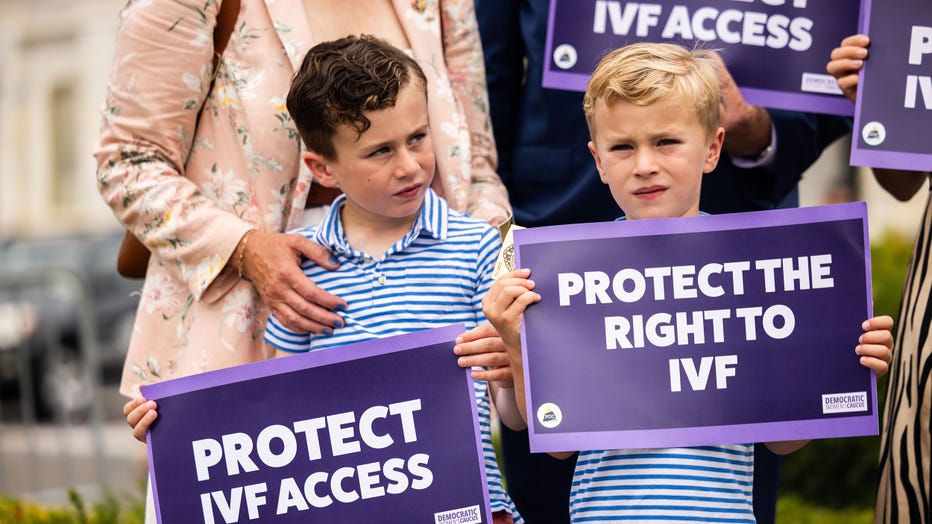IVF and IUI: What's the difference?
Minnesota Gov. Tim Walz and his wife have been open about their struggle to have children, but after coming under fire from conservatives, Minnesota’s first lady is now clarifying which fertility treatment they used.
Walz, Democratic presidential nominee Kamala Harris’ running mate, has made his family’s struggle with fertility a central part of his narrative. His self-described "journey with IVF" has helped him connect with voters alarmed at the erosion of reproductive rights in the U.S.
Earlier this month, Walz criticized Ohio Sen. JD Vance, the Republican candidate for vice president, by saying, "If it was up to him, I wouldn’t have a family because of IVF."
But in a statement issued Tuesday, his wife Gwen Walz said they didn’t use IVF (in-vitro fertilization). Instead, they relied on a different process known as intrauterine insemination, or IUI.
READ MORE: Gov. Tim Walz's wife clarifies fertility treatment was IUI, not IVF
IUI is often attempted before IVF, but it doesn’t face the same level of political controversy because it doesn’t risk destroying unused embryos that anti-abortion advocates say equate to unborn children.

FILE - Liam Mullin (L) and Landon Mullin (R), the sons of Rep. Kevin Mullin (D-CA), hold signs during a news conference in honor of World IVF Day to discuss the next steps for legislation to protect access to in vitro fertilization across America on
What is IUI?
Intrauterine insemination, or IUI, involves the washing and insertion of sperm directly into the uterus, according to Northwestern Medicine. This can be done as part of a natural cycle or, more often, in combination with medications (like clomiphene citrate or letrozole).
The washed sperm sample will contain more motile sperm, which are more likely to fertilize an egg, the Associated Press reports. Additionally, placing sperm directly into the uterus means they do not need to "swim" as far to reach their target.
Couples struggling with infertility often start treatment with IUI, which is much less invasive than IVF.
RELATED: The cost of IVF in 2024
IUI is also used by couples who are having trouble conceiving for other reasons, such as their work or travel schedule, or sexual dysfunction.
It is important to note that many women undergoing IUI are given hormones or medication in order to induce ovulation or to increase the number of eggs that are ovulated each month. This increases a couple’s chances of having twins or multiples. Although many couples undergoing fertility treatment welcome the idea of having twins or even more babies, in reality, having multiples will introduce complications for the mother and the babies.
What is IVF?
In-vitro fertilization, or IVF, offers another possible solution when a woman has trouble getting pregnant.
IVF takes eggs from a woman’s ovaries, then fertilizes them in a lab using collected sperm, according to Northwestern Medicine.
READ MORE: Jennifer Aniston slams JD Vance's 'childless cat ladies' comment
IVF is done in cycles and may take more than one to create a successful pregnancy, The American College of Obstetricians and Gynecologists says. The procedure can use a couple’s eggs and sperm or those from a donor.
Why has IVF become controversial?
IVF dominated headlines in February when the Alabama Supreme Court ruled that frozen embryos could be considered children under state law.
IVF procedures were temporarily halted, shocking people who were trying to become parents and injecting an emotionally sensitive issue into the national debate over reproductive rights.
Alabama lawmakers moved fast to approve measures that protect in-vitro fertilization clinics, but the ruling has caused many doctors nationwide to worry about possible national implications of the court decision.
READ MORE: Survey: 3 in 4 reproductive age women in the US think abortion should be legal
Anti-abortion advocates say the unused embryos equate to unborn children. Opposition to IVF has gained momentum since the overturn of Roe v. Wade in 2022, though former President Donald Trump and Vice President Kamala Harris have said IVF should be protected.
"Those who are firmly committed to the idea that life begins at fertilization are circling back to the movement’s earlier opposition," Margaret Marsh, a history professor at Rutgers University in New Jersey, told the Associated Press. "Not everyone in the anti-abortion movement opposes these reproductive technologies, but many do."

